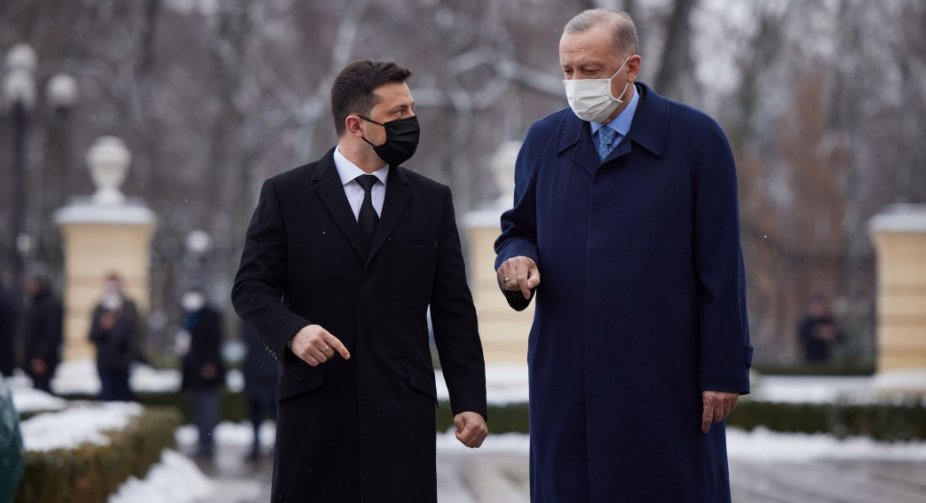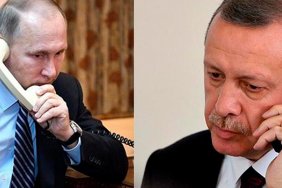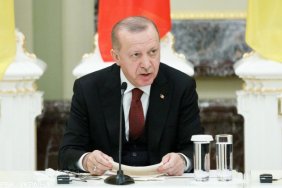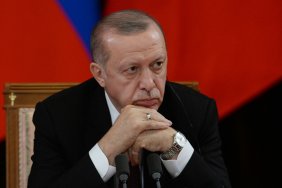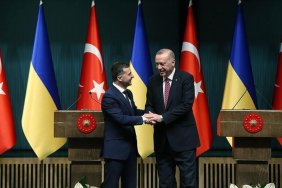Ukraine welcomed Turkish President Recep Erdogan with the opening of two new consulates general - in Lviv and Kharkiv. Ukrainian experts believe that the issues discussed by the Ukrainian and Turkish leaders were worth the celebrations that accompanied Erdogan's visit.
Is Erdogan's visit today a demonstration of Turkey's support for Ukraine?
Yevgen Magda: It should be understood that Recep Erdogan has his own game. And this game is different from both the Russian and Ukrainian games. It has an element of military-political cooperation with Ukraine, and pushing through a free trade zone, in which Turkey is interested, and a kind of geopolitical tango with Vladimir Putin. So I think that Erdogan did not have coordination with the other NATO leaders - it was his personal initiative, including the proposal to move the trilateral contact group meetings to Istanbul, where he thinks the negotiations can be held.
Alexei Golobutsky: This is a sign that Turkey, as a regional leader, is showing that it is maintaining this leadership status. It is quite logical that the Crimea is an object of attention of Turkey because the Crimean Tatar people are a part of this Turkic community. There is a huge diaspora in Turkey, and in general Erdogan has never denied that he supports the belonging of Crimea.
Oleg Saakyan: I don't think this should be seen as a message towards Moscow. It is an affirmation of its role as a regional leader, and therefore a presence in a "hot spot" with its own agenda, its own interests. Turkey could not stand aside - it has serious relations with the Russian Federation and Ukraine. And it needed to take some kind of position, to show its leadership.
This was done in two tracks. The first is to offer ourselves as a peacemaker, that is, we are not taking sides, but we support the territorial integrity of Ukraine, including Crimea. Which is, on the one hand, for Turkey, an element of their foreign policy and security concept, their national interests. And on the other hand, it is a factor in their domestic politics. Because the significant Tatar community in Turkey itself is dozens of times larger than in Ukraine, and the issue of Crimea is a powerful electoral factor.
Therefore, Turkey, even speaking about the territorial integrity of Ukraine in Erdogan's mouth, emphasizes Crimea, among other things, directly with emphasis.
The second part of the agenda is economic. It is the jubilee meeting of the Ukraine-Turkey Cooperation Council, the signing of agreements, starting from the Free Trade Zone that started under the Ukrainian president before the last one and has been dragging on for a long time. To all appearances, Turkey decided to use this opportunity, because for President Zelensky it is necessary for the domestic policy - to calm down the investors, to show that despite the accumulation of the Russian army at the border, everything is fine, everything is good and there are prospects.
And on the other side - foreign policy - it is clear that this is a message that everything is stable in Ukraine, and domestic policy - it can be presented as a victory in the economic sphere. And Zelensky does not have many such victories. Alas!
That is why Turkey decided to take advantage of this window of opportunity, so the long-winded process of signing the Free Trade Zone Treaty has now come to its conclusion.
There is also a parallel cooperation in the military industrial complex. Here, for Turkey, Ukraine acts as a window to Europe in the direct sense of the word, in terms of substitution of the technologies, which are unavailable for Turkey after the Karabakh conflict. And also for Ukraine, Turkey today is one of the most reliable partners in the cooperation of the military-industrial complex in terms of substitution of those parts which are inaccessible for us on the foreign market. This is mutually beneficial for both of us, not to mention the fact that this entire visit also concerns the security of the Black Sea region, in which for Ukraine the issue of the Russian factor - our enemy - is a direct security threat.
And for Turkey, the occupation of Crimea and the build-up of troops in the Black Sea basin is a potential threat and a change in the balance of power not in Turkey's favor. Therefore, both Ukraine and Turkey today are absolutely with a cool head, having no illusions about each other, and understanding that in addition to the wide field of cooperation we have potentially possible points of conflict, we help each other in the highest degree of rationality.
Will Turkey play a more active role in initiating new gas flows alternative to the Russian ones?
Yevgen Magda: I think that Turkey plays different cards in the gas question, some of the cards are actually Turkish. Therefore I think that Turkey will be an active participant of various gas projects. Let me remind you that Hungary, which refused from gas transit through the Ukraine, now receives it including through the Turkish Stream. And I think there will be many examples of such hybrid cooperation.
Alexei Golobutsky: The West, and Europe in the first place, as the largest consumer of Russian gas, began to review their relations with Russia not today and not even yesterday. This was obvious several years ago, but now these processes have intensified.
So the West will go on buying Russian gas, but it will do its best to reduce its share of it, not to 40% but, say, 10-15%. Naturally, they will use TANAM and other ways to do it, because Russia has already disclosed its intentions in full.
Oleh Saakyan: I think so, and Turkey has two windows of possibilities here: the first is the transit projects of gas pipelines, and the second is that it has a key to the Bosporus and a possibility to supply liquefied gas. With these two elements Turkey can play in the gas market and increase the transit of hydrocarbons through itself.
Can we say that the visit of Boris Johnson and Recep Erdogan in one week to Ukraine leveled the scandal that broke out in the media after Vladimir Zelensky's conversation with Joe Biden?
Yevgen Magda: First of all, there is no talk of any substantive de-escalation at the moment. Although there is some lull. And it's not about Erdogan's visit, it's not about Johnson's visit, and it's not about Morawiecki's visit. The point is that the USA has taken a certain position and will hold on to it for some time. The United States is the main player in this case. Russia understands this very well and is focused on the United States. Ukraine needs to search for strengthening of its own subjectness and activization of its foreign policy, including by means of creating new alliances and development of already existing ones.
Alexei Golobutsky: Everyone takes the threat of Russia seriously. And there hasn't been much of a scandal either. Ukraine and Zelensky, though they may understand the peculiarities of the United States, don't seem to want to commiserate. America does not just spread panic; unlike Putin, they have to convince their own people, too, that they give money and arms not for nothing, but for a certain purpose, that there is such a danger. Because the war in the center of Europe is a danger eventually for America too, not only for Europe.
Oleg Saakyan: In this regard, we can say that internal political scandals in Zelensky's team interrupt even the visits of Johnson and Erdogan, but in terms of foreign agenda certainly. And the unprecedented visit of the British prime minister. And for the first time in more than 20 years, the visit of the Dutch prime minister to Kiev, and after that the visit of Erdogan, which was quite expected but large-scale both in terms of the issues presented and the agenda, of course largely outstripped the factor of the negotiations with Biden.
And Zelensky is not only a statesman, but also a public politician who thinks about elections, the results of which will be affected by the panic hitting the economy. Of course, in the case of an escalation, if a war breaks out, God forbid, all this will become irrelevant - what Biden said, what he didn't say. All this will be forgotten, there will be completely different agendas. But in the case of de-escalation, nothing will be forgotten. Our population has a fairly critical attitude towards any government, and because of this, they will not feel much love for it. Self-doubt, and this is a manifestation of insecurity, is not forgiven. That is why Zelensky is in a very difficult position. The visit of Johnson and Erdogan is a big positive, each of them has its own logic and plays its own role.
